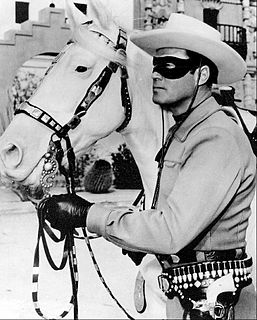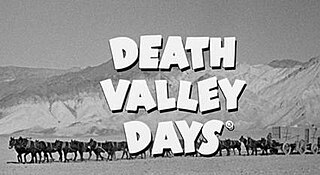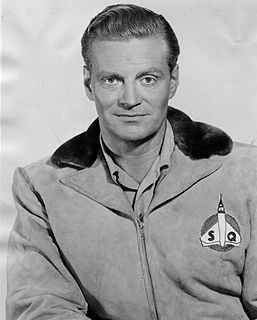
The Lone Ranger is a fictional masked former Texas Ranger who fought outlaws in the American Old West with his Native American friend, Tonto. The character has been called an enduring icon of American culture.

Red Ryder was a Western comic strip created by Stephen Slesinger and artist Fred Harman which served as the basis for a wide array of character merchandising. Syndicated by Newspaper Enterprise Association, the strip ran from Sunday, November 6, 1938, through 1965.
Broadcast syndication is the practice of leasing the right to broadcasting television shows and radio programs to multiple television stations and radio stations, without going through a broadcast network. It is common in the United States where broadcast programming is scheduled by television networks with local independent affiliates. Syndication is less widespread in the rest of the world, as most countries have centralized networks or television stations without local affiliates. Shows can be syndicated internationally, although this is less common.

I Love a Mystery is an American radio drama series that aired 1939–44, about three friends who ran a detective agency and traveled the world in search of adventure. Written by Carlton E. Morse, the program was the polar opposite of Morse's other success, the long-running One Man's Family.

George Glenn Strange was an American actor who mostly appeared in Western films and was billed as Glenn Strange. He is best remembered for playing Frankenstein's monster in three Universal films during the 1940s and for his role as Sam Noonan, the bartender on CBS's Gunsmoke television series.

Death Valley Days is an American old-time radio and television anthology series featuring true accounts of the American Old West, particularly the Death Valley country of southeastern California. Created in 1930 by Ruth Woodman, the program was broadcast on radio until 1945. From 1952 to 1970, it became a syndicated television series, with reruns continuing through August 1, 1975. The radio and television versions combined to make the show "one of the longest-running Western programs in broadcast history."

The Adventures of Superman is a long-running radio serial that originally aired from 1940 to 1951 featuring the DC Comics character Superman.

Captain Midnight is a U.S. adventure franchise first broadcast as a radio serial from 1938 to 1949. The character's popularity throughout the 1940s and into the mid-1950s extended to serial films (1942), a television show (1954–1956), a syndicated newspaper strip, and a comic book title (1942–1948).

Gerald Mohr was an American radio, film, and television character actor and frequent leading man, who appeared in more than 500 radio plays, 73 films, and over 100 television shows.

The Adventures of Ellery Queen is the title of a radio series and four separate television series made from the 1950s through the 1970s. They were based on the fictional detective and pseudonymous writer Ellery Queen and the cases he solved with his father, Inspector Richard Queen.
Blackstone, the Magic Detective was a 15-minute radio series based on Elmer Cecil Stoner's comic book series Blackstone, Master Magician. The program aired Sunday afternoons at 2:45pm on the Mutual Broadcasting System from October 3, 1948, until March 26, 1950.
Martin Kane, Private Eye is an American crime drama radio and television series sponsored by United States Tobacco Company. It aired via radio from 1949 to 1952 and was simultaneously a television series on NBC from 1949 to 1954. It was the "earliest of successful cops-and-robbers series" on television.

The Adventures of Dick Cole was a 1940s comic book series, created by Bob Davis. It was published by Novelty Press, and later, Star Publications. Dick Cole is a heroic cadet at the fictional Farr Military Academy. The character was introduced in the "Origin of Dick Cole," in the first issue of Novelty Press' Blue Bolt Comics.

The Adventures of Frank Race was an American radio adventure serial syndicated by Bruce Eells Productions. The 30-minute program's first East Coast broadcast was 1949, and the show ran 43 episodes. Because it was syndicated, it aired on different stations on different days. For instance, in New York City, the first episode ran on WINS on April 9, 1949. It "began running in some markets May 1, 1949. The series was broadcast on the West Coast from 1951–52.
Adventures in Good Music, hosted by Karl Haas, was radio's most widely listened-to classical music program, and aired nationally in the U.S. from 1970 to 2007. The program was also syndicated to commercial and public radio stations around the world.
In television and radio programming, a serial is a show that has a continuing plot that unfolds in a sequential episode-by-episode fashion. Serials typically follow main story arcs that span entire television seasons or even the complete run of the series, and sometimes spinoffs, which distinguishes them from episodic television that relies on more stand-alone episodes. Worldwide, the soap opera is the most prominent form of serial dramatic programming. In the UK the serial began as a direct adaptations of well known literary works, usually consisting of a small number of episodes.

Buffalo Bill, Jr. is an American western television series with Dick Jones (1927–2014) in the title role of a young fictional marshal in West Texas. The series aired in syndication from March 1, 1955, until September 21, 1956.

Chandu the Magician is an American supernatural radio drama which originally aired from 1931–1936. A revival on a different network took place 12 years later, airing from 1948–1950. The series was created by Harry A. Earnshaw (1878–1953) and Raymond R. Morgan. The two series starred Frank Chandler, also known as Chandu, an American who had learned mystical arts, such as astral projection, which he used to fight criminals and villains, including the evil Baron Roxor. Chandu was Stan Lee's inspiration for the more famous Marvel Comics character Doctor Strange.
Dangerous Assignment was an NBC radio drama starring Brian Donlevy broadcast in the US 1949–1953, a syndicated television series distributed in the US 1951–52, and an Australian radio series broadcast in 1954-56 as remakes of the original American radio scripts.












